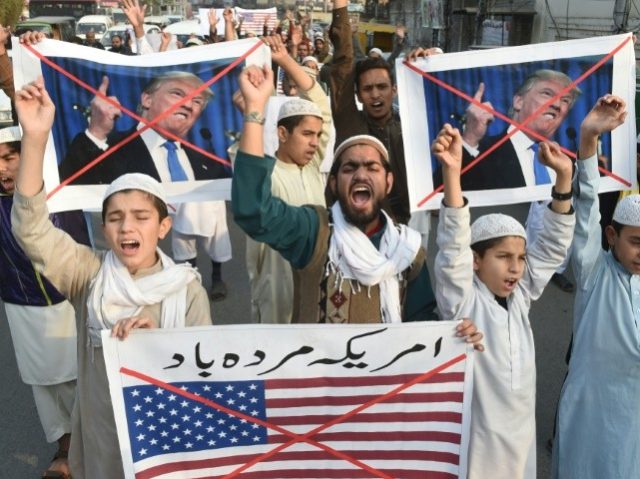Pakistan’s foreign ministry claimed to annul its alliance with the United States after the Trump administration reportedly suspended an estimated $1 billion in security aid for refusing to take decisive action against jihadists who are fighting American troops and their allies in Afghanistan.
“We do not have any alliance” with the United States, Pakistan’s Foreign Minister Khawaja Muhammad Asif told the Wall Street Journal (WSJ) on Friday. “This is not how allies behave.”
Asif accused American President Donald Trump’s administration of turning Pakistan into a “whipping boy.”
His comments came a day after Heather Nauert, a spokeswoman for the U.S. Department of State (DOS), told reporters, “We are suspending security assistance, security assistance only, to Pakistan at this time until the Pakistani Government takes decisive action against groups, including the Afghan Taliban and the Haqqani Network. We consider them to be destabilizing the region and also targeting U.S. personnel.”
That same day, an anonymous DOS official explained to reporters that the Trump administration is only freezing the aid.
“The suspension is not a permanent cutoff at this time,” pointed out the unnamed State official, adding: “Our hope, and I won’t say our expectation, but our hope, is that Pakistan will understand our seriousness, that they appreciate the value of this relationship—which they clearly have indicated that they do, and I believe that they genuinely do—and that they will look at what additional they can do to try to address … our requests.”
Besides calling on Pakistan to combat the Afghan Taliban and its al-Qaeda-linked Haqqani Network allies, which the Pentagon has deemed the top threat against U.S. troops in Afghanistan, the anonymous DOS official also urged Islamabad to take action against anti-India terrorist groups such as Lashkar-e Tayyiba (LET) and Jaish-e Mohammed (JEM).
The Trump administration has praised India’s contributions to combating jihadist groups in Afghanistan. Pakistan considers India its regional enemy.
Since taking office, President Trump has repeatedly accused Pakistan of harboring jihadists.
The U.S. State Department refused to provide an exact figure for how much aid it the Trump administration would suspend, arguing that the numbers are still being calculated.
However, Reuters learned that in addition to the $255 million in foreign military financing (FMF) used to purchase American military hardware, the U.S. is also expected to withhold at least $900 million in coalition support funds (CSF), which reimburse Pakistan for counter-terrorism activities.
Reuters reports:
CSF funds, which fall under Defense Department authority, are covered by the freeze, said Pentagon spokesman Commander Patrick Evans, saying Congress authorized up to $900 million in such money for Pakistan for fiscal year 2017, which ended September 30. None of that money has yet been disbursed.
The freeze also covers $255 million in FMF for fiscal year 2016, which falls under State Department authority and whose suspension has already been announced, as well as unspecified amounts of FMF that went unspent in earlier fiscal years.
In announcing the suspension of security aid to Pakistan, the unnamed State official told reporters Thursday:
The United States will not deliver military equipment or transfer security-related funds to Pakistan unless required by law. Exceptions may be made on a case-by-case basis if they are determined to be critical to national security interests.
Aid cuts will not impact civilian assistance to Pakistan, noted the State Department.
On Thursday, the DOS officials conceded that Islamabad had taken action against some terrorist groups, telling reporters:
The United States acknowledges and appreciates Pakistan’s successful efforts to combat militants that threaten the Pakistani state, such as the Pakistani Taliban, al-Qaida, and ISIS [Islamic State]. And Pakistan has sacrificed a significant amount, including tens of thousands of military and security officials, as well as civilians killed in the fight against terrorism over the last couple of years.
The Afghan and Pakistani wings of the Taliban consider themselves two distinct groups.
Since the Afghanistan war erupted in October 2001, the United States has awarded Pakistan an estimated $33 billion in American taxpayer-funded aid.
Nevertheless, most jihadi strongholds in Afghanistan lie along the Pakistan border.
Moreover, the majority of attacks and fatalities in Afghanistan take place in areas along the international boundary that separates the nation from Pakistan.
Pakistan has long rejected accusations from the United States, Afghanistan, and India that it supports terrorist groups in South Asia.
The Afghanistan-Pakistan region is home to the “highest regional concentration” of terrorist groups in the world, according to the U.S. military.
In response to the Trump administration’s aid cuts, Pakistan’s opposition leader Imran Khan has urged Islamabad to expel some American diplomatic personnel and cut off supply routes for the U.S./NATO-led coalition forces as well as close its airspace to American troops.
When unveiling his Afghanistan war strategy in August, President Trump urged Pakistan to take action against jihadist groups operating within its borders.
“It has been more than four months since the President’s speech, and despite a sustained high-level engagement by this administration with the Government of Pakistan, the Taliban and the Haqqani Network continue to find sanctuary inside Pakistan as they plot to destabilize Afghanistan and also attack U.S. and allied personnel,” noted the DOS spokeswoman.

COMMENTS
Please let us know if you're having issues with commenting.